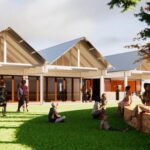Sustainable ecovillage gets attention of residents across the world

LONDON: A 350-home multigenerational ecovillage — believed to be the most sustainable development in the world — is drawing interest from across the globe.
The joint venture by Sustainable Settlements and the Perron Group is preparing to launch lots from its fourth stage, having sold its first three stages through word-of-mouth.
Buyers seeking land in the revolutionary community have come from as far as England and New Zealand, every other capital city in Australia, as well as Perth and the local South West community.
Renowned environmental scientist Peter Newman said he believes it is the single most sustainable development in the world.
Director of Sustainable Settlements Mike Hulme and partner Michelle Sheridan, pictured right, began the journey to create a green community on 120ha of farming land 13 years ago.
Aided by the deep pockets of the Perron Group, they spent the next 11 years gaining necessary approvals for what their website promises is a “glimpse to a better world”.
All planned 350 homes and commercial buildings will be carbon negative and have a minimum 8-star NATHERS rating.
Each property — 20 homes have already been built — will use sustainable building materials and methods, such as earth render and straw-bale construction.
Mr Hulme said the community will be entirely powered by solar energy, and use rainwater captured onsite. It is hoped that all of the community’s fresh food will come from community gardens and its dams. There will be 11 EV charging stations.
Mr Hulme said buyers were also drawn to the community’s sense of community.
Every cluster of 11 homes shared a communal garden, a children’s playground and other meeting spaces, along with easy access to other clusters of homes and the village.
“People are not designed to be alone,” he said.
Mr Hulme said lots of land had been priced to allow for 15 per cent affordable housing, to ensure diversity in the community and to help address the housing crisis.
He said communities had to learn from nature, which proved that the most resilient populations were the most diverse.
To date, most buyers were professionals in the 30 to 40-year age group, many with children.
Mr Hulme warned government bodies needed to reform the approvals process to make it economically viable for others to emulate the project. He said the group spent $65 million before it saw a return, and will not see a profit until its stage five lots are sold.







